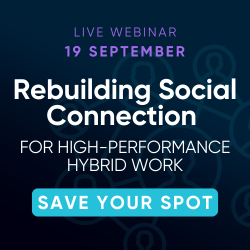September 7, 2023
How to rebuild social connection for high-performance hybrid work: a deep-dive for workplace innovators
 Social connection is often cited as a justification for return-to-office mandates, many of which are not well received by employees. This suggests that merely spending time in the office isn’t enough to spark the connection that gets ideas flowing, ramps up performance and creates a cohesive culture. So, if physical presence alone isn’t enough to rebuild connection, what is? Workplace innovators exploring the issues around hybrid work now have the opportunity to dig deep and find out.
Social connection is often cited as a justification for return-to-office mandates, many of which are not well received by employees. This suggests that merely spending time in the office isn’t enough to spark the connection that gets ideas flowing, ramps up performance and creates a cohesive culture. So, if physical presence alone isn’t enough to rebuild connection, what is? Workplace innovators exploring the issues around hybrid work now have the opportunity to dig deep and find out.
Tune into HubStar’s upcoming webinar on Thursday September 19th at 4 PM BST for an exploration of the approaches, strategies and tools necessary to rebuild social connection in complex hybrid workplaces.
Workplace innovators are facing the greatest opportunity of our generation to positively disrupt the way we work, but as Einstein said, we can’t solve problems with the same kind of thinking we used to create them.
So what kind of thinking is required to ignite the magic of meaningful connection at work? How do we stop hybrid work strategies from stalling? And, which tools and approaches can help us manage the complexity inherent in new ways of working?
In this 30 minute webinar, you’ll discover:
- Key trends impacting people, hybrid workplaces and organisational performance in 2023 and beyond
- A step-by-step framework for overcoming remote working inertia and rebuilding social connection in the office
- Dynamic Workplace Management: a new framework for positive change across 3 dimensions: people, profit and planet
The webinar will include a live Q&A with the speaker, Jane Young and the VP Product at HubStar, Chris L’Hommedieu.
HubStar is a global company with operations in the US, UK, Europe and APAC. The company provides a next-generation dynamic workplace management platform to drive productivity, collaboration and workplace experience while reducing real estate costs. HubStar helps thousands of teams in over 60 countries create dynamic workplaces. For more information visit hubstar.com























 A new poll of people aged between 35 and 55 suggests that most workers expect to retire at around 62 years old, four years earlier than the UK state pension age of 66. The report called
A new poll of people aged between 35 and 55 suggests that most workers expect to retire at around 62 years old, four years earlier than the UK state pension age of 66. The report called 











September 14, 2023
Is the Flexible Working Bill a game changer or paper tiger?
by Sam Ross • Comment, Flexible working